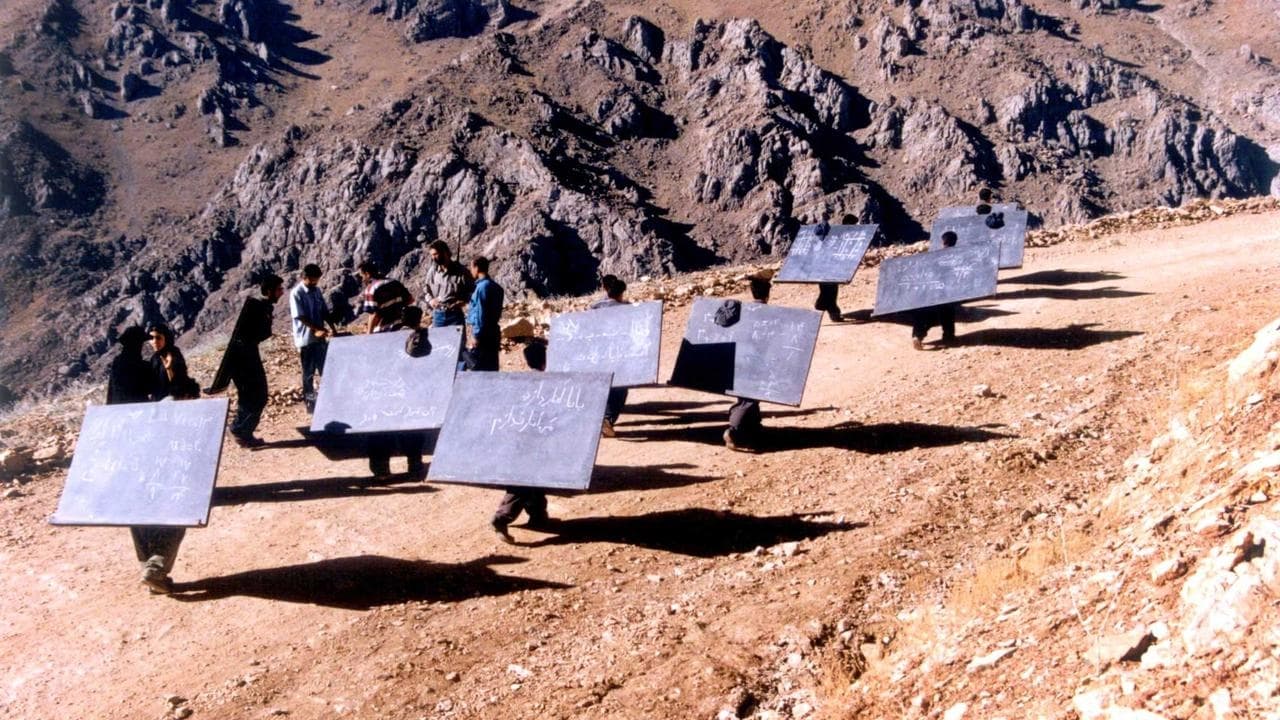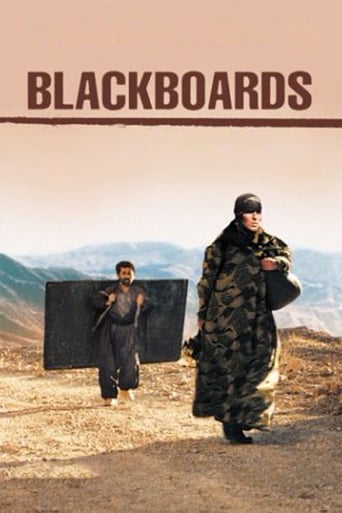

Purely Joyful Movie!
... View MoreIt's fun, it's light, [but] it has a hard time when its tries to get heavy.
... View MoreOne of the most extraordinary films you will see this year. Take that as you want.
... View MoreI didn’t really have many expectations going into the movie (good or bad), but I actually really enjoyed it. I really liked the characters and the banter between them.
... View MoreBlackboards -- Persian/Kurdish name تخته سیه -- takhte siyah, where تخته (takht) means board and سیه (siyah) is dark. I don't know anything about Persian but with my limited knowledge of Arabic I could make it out.If you are looking for a charismatic film, with a flamboyant young hero, great action, sensuous, colorful heroine or for a great fighting sequence and men jumping out of a flight and your adrenaline pumping till the end of the movie -- you should NOT be watching this. This is my 2nd.film of Samira Makhmalbaf that I am watching after ' At 5 in the afternoon.' There is no point in comparing the 2 work of art but I would consider this film, as a real stroke of the genius.If you are looking for a story line -- it has NOTHING, primarily Samira's and her father Mohsen Makhmalbaf does not have a specific story line. It is a journey - a journey of a Kurdish teacher during the 8 years long Iran- Iraq war which commenced in 1980.Said Mohamadi or Said is a Kurdish teacher, who carries at his back a blackboard - which in many ways become a symbol of love, war, marriage and separation. He carries the multiplication table of 2 and 3 and yearns to teach the young people. The film starts with a lot of teachers معلمان -- or 'mualamin' -- as you will hear the word quiet often in the film, walking on a rugged terrain of Iran, searching for students. They talk of desperation and frustration about the dearth of students. Is the director, Samira/Mohsen trying to put up an irony ? Who is willing to learn? Are we, the civilized people, living under favorable condition willing to learn? Then, why to blame the Kurds who struggle every moment for food and water willing to learn?Then suddenly they hear the gun fire from the helicopters and the group disperses, each moving in their own direction. Said, then joins a group of people who are walking and Said promises to take them to the border. The deal got finalized over 45 walnuts !! The person in the group agrees to give it to Said once they reach the group. Samira Makhmalbaf, shows her ingenuity in selecting different characters in the group. An old man, suffering from urinary problem, a woman carrying her child and few other people who are struggling for food, water, maladies of varied degrees. All those characters, are submerged into an unison -- fight for existence. Said is unable to find a single person who is willing to learn and faces the denial on a repetitive manner. Finally a young boy Reeboir agrees to learn. The film portrays Said as a altruist, who endangers his life to teach his students. When chased by the rebels, the film shows Said constantly uttering the multiplication table and the correct pronunciation of Reeboir, when clambering down the hills Said is rising and so his only student Reeboir.The young boys, they call themselves mules are clueless about where they are going. They are not willing to learn.The blackboard symobilzes the man's journey -- becomes an object of need when required. When a young boy falls down the cliff, Said's black board is cut into and given an aid to his amputated limb, as a support to dry clothing and a shelter to hide during the gunfire. Said gets married to Halaleh played by Behnaz Jafari just behind the blackboard and she asks her dowry -- a blackboard.The film hovers around the struggle, suffering and mankind's zeal to survive under the most unfavorable conditions. I would not conclude the film here as there is a inconspicuous ending......What happens at the end is predictable but how it happens is what the genius of Samira and Mohsen Makhmalbaf shows us.To me it is not just a film - it is actually what is happening and that is how it happens and that is what reality is. Reality in film is best shown here and we should rise up from the romanticism of our thoughts and embrace the truth.
... View MoreReleased in 2000, BLACKBOARDS was the second film by Samira Makhmalbaf, daughter of acclaimed Iranian auteur Mohsen Makhmalbaf and a precocious director in her own right. As the film opens, a group of itinerant teachers lug blackboards into the mountains of Iranian Kurdistan, seeking to bring education to this illiterate, impoverished region in exchange for some meagre income.Two of the teachers quickly branch off from the group, and the film follows their adventures. Saïd (Saïd Mohamadi) falls in with a group of nomads trying to get back to their native land across the border in Iraqi Kurdistan. Rebwar (Bahman Ghobadi) meets a group of children transporting contraband over the border. The teacher's efforts to help the locals learn to read and write are rebuffed time and time again, to the point that the film takes on the quality of a play by Samuel Beckett or Harold Pinter. Saïd's attempts to get through to the lone woman in the party (Behnaz Jafari) are the height of absurdism.Samira Makhmalbaf's visual aesthetic is mainly that of her father's early films, and the film evokes the beauty of this mountainous region, as well as the desolation that causes its poverty. And it's cool that the dialogue is in Kurdish, as there aren't so many films available in the West that highlight this people. However, I must say that I found other aspects disappointing. BLACKBOARDS makes a thought-provoking point that the poor are too busy surviving to worry about ideals like education, but the script doesn't really hang together. The acting is also inconsistent, with a big disconnect between the professional actors and the local Kurds who were brought on.You might take a chance on BLACKBOARDS. I certainly don't regret seeing it, it's memorable and there's some humour. But I remain unsatisfied.
... View MoreThis is a rather well made movie, that shows some of the problems in Iran that affects its poor northern citizens, without luckily ever getting over-dramatic or too sentimental but at the same time it's also lacking in true depth to make this a powerful or impressive movie.It's a slow moving movie that is entirely filmed with handhold camera, with lots of long sequences. It works good for a realism and the atmosphere of the whole movie but at the same time means that this is not a movie for just everyone. You must be able to handle the slow- and different way of storytelling to appreciate this movie fully.The movie is good looking, with its moody, never-ending, landscapes and good camera positions to tell the story with. The dialog is realistic, though not always interesting. I mean they basically say the same things five times in a row in this movie, which perhaps is a bit irritating. This is also due to the non-professional actors that play in this movie. Needless to say that not everything works out fully in this movie, especially when it comes down to the true emotion or depth of the movie. Lucklily there is no lack of realism, although the movie its story pushes it at times. But on the other hand it's the story that still makes this a pleasant movie to watch. The subject might be heavy and serious but luckily the movie doesn't try to emphasis this. The end result is a good and not heavy to watch movie that is absolutely worth seeing but lacking in real emotions or depth to make a true lasting impression.The movie is told from an original point of view; A couple of schoolteachers that travel trough the North of the country to remote villages and groups of refugees, to teach them the basic things such as writing, reading and simple math, to try and give everyone a better future and at the same time earn some money or get some free food as well. They're mixed up in all the difficulties but yet they're no part of it. If they want they can walk away from all the troubles if they choose to. They're objective in the whole situation and they don't do more than is ever asked of them.Most of the characters in this movie are being played by non-actors. It works realistic but at the same time is one of the reasons why the movie is lacking in any true depth or well acted out emotions. The movie as a whole is effective and it makes its point well but it does so without ever impressing too much, with the exception of one or two great sequences.Samira Makhmalbaf has some good and promising potential as a filmmaker and is possible future Oscar potential, just like her father, who also co-wrote this movie but her movies have to become even more confronting and daring if she wants to achieve that.7/10http://bobafett1138.blogspot.com/
... View Morethe film is about a group of Kurdish people who migrated to Iran after Halebje massacre in 1988. the film starts at a point that people want to return their homeland(Iraq).i think Makhmalbaf was not depicted the mere story of a group of people but she wanted to show how Kurdish people live in mountains of mid-east for centuries to all people of the world.the film's runtime is about 85 minutes but it is the whole history(maybe destiny) of Kurds, guns,massacres,blood,ignorance...Said is an idealist teacher who want to enlighten his people. the woman character tells us the psychological effects of the Halabje massacre. when border soldiers fire the group she says "again nuclear weapons..." i think it is very interesting in that it shows the brutality of the Saddam regime who used nuclear weapons and killed about 5000 children, women and the old.
... View More